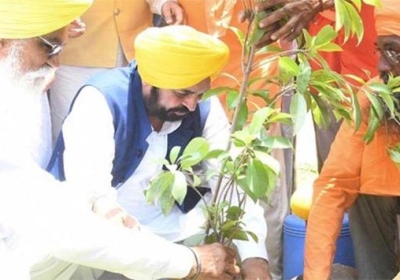
'Bavandar Baba' speaks at Mahakumbh
'Bavandar Baba' urges Hindus to listen; on a divine mission at Mahakumbh
At the ongoing Mahakumbh 2025 in Prayagraj, an unusual and energetic figure has caught the attention of many. This individual, known as 'Bawandar Baba', is making waves with his unique way of spreading religious awareness. Instead of following the traditional paths of spiritual leaders, Baba has embarked on a mission that has seen him travel across India on a motorcycle, visiting significant religious sites, and trying to awaken Hindus about the importance of respecting their own religion, gods, and cultural values.
Bawandar Baba’s message is simple yet powerful: he urges Hindus to realize the damage they are doing to their own religion by disrespecting gods and religious symbols. He believes that Hindus, despite being born into the religion, have adopted Western lifestyles to such an extent that they no longer truly follow the teachings of their faith. His mission is to bring back the respect and reverence that Hindus once had for their deities, their rituals, and their way of life.
Bawandar Baba’s journey and awakening message
Bawandar Baba, whose real name is Vinod Sanatani, hails from Indore in Madhya Pradesh. At the age of 14, he chose the path of renunciation, dedicating his life to a spiritual mission. Unlike other spiritual leaders, Bawandar Baba does not stay in ashrams or traditional camps. Instead, he travels across the country on his motorcycle, which he has used to cover an impressive distance of 1,15,000 kilometers. His journey includes visits to 12 Jyotirlingas, 29 Shakti Peeths, and several temples across 25 states.
What makes Baba’s journey even more remarkable is that he is not just traveling for personal spiritual growth. He has set out on a mission to awaken Hindus to the disrespect their religion and gods are being subjected to in modern times. According to Baba, Hindus have adopted many habits from Western culture, leading them to forget the reverence they should show toward their gods. In his view, this shift in lifestyle has caused a loss of respect for Hindu deities and their images.
During his time at the Mahakumbh, Baba has taken the opportunity to speak out about the state of Hinduism in the country. He has pointed out that, while many Hindus are born into the religion and live in India, their actions do not reflect their faith. Baba emphasizes that modern-day Hindus have strayed far from the traditional values of their ancestors and are now living a life heavily influenced by Western culture. He highlights how many Hindus no longer pay proper respect to religious icons and deities. They may toss idols aside carelessly or treat sacred objects with little regard.
Bawandar Baba has also raised concerns about how Hindu religious items, like calendars, images, and idols, are being treated disrespectfully. He mentions how idols and pictures of gods are often found discarded in trash or abandoned by the roadside. The disrespect for these sacred items deeply troubles Baba, as he believes that this behavior goes against the very essence of Hinduism. According to him, Hindus should treat their gods with the utmost respect, which includes properly disposing of religious items in a manner that honors their significance.
Baba’s critique of the Hindu community extends to the rituals that are sometimes performed without due reverence. For example, he talks about how Hindu wedding invitations and other documents feature images of gods and goddesses, but after the event, these papers are discarded like ordinary waste. Such actions, he argues, are a form of disrespect to the deities, and he calls on Hindus to stop this practice. He believes that this treatment of religious images is a sign of a larger problem in Hindu society, one where the importance of faith has been diluted over time.
His mission is not just about pointing out the flaws in society but also about offering a solution. He urges Hindus to return to the basics of their faith and respect their gods in a meaningful way. Baba calls for Hindus to stop using religious images for trivial purposes, and instead, to treat them with the dignity they deserve. He also emphasizes that the way Hindus treat their gods is a reflection of how much they value their culture and traditions.
Bawandar Baba’s life and lifestyle
Bawandar Baba’s personal life is as unconventional as his mission. Since he took the vow of renunciation at a young age, Baba has lived a simple and austere life. His daily routines revolve around his motorcycle, which serves not just as a mode of transportation but as his home, workspace, and spiritual companion. Baba eats and sleeps on his bike, continuing his travels and spiritual work without any dependence on a traditional ashram or fixed shelter.
During the Mahakumbh, Baba has made it clear that he is not staying in any of the camps set up for sadhu-saints. Instead, he will continue his journey, visiting the sacred spots in Prayagraj and spreading his message to those who are willing to listen. His presence at the Mahakumbh is symbolic of his commitment to his mission, as he uses the occasion to reach out to a larger audience and urge them to reflect on their behavior.
Baba’s lifestyle is a testament to his dedication to the cause he believes in. He has spent the past three and a half years traveling across India, spreading his message to Hindus everywhere. His journey has been a mix of spiritual devotion, social activism, and cultural preservation, all carried out from the back of his motorcycle.
ALSO READ: IITian Baba abruptly leaves Mahakumbh, vacates Camp amid speculation over major reason
Bawandar Baba’s message is one of awakening and reflection. In a world where modernity has significantly impacted traditional ways of life, he urges Hindus to return to the core values of their faith. Through his motorcycle journey, Baba is working tirelessly to remind Hindus of the importance of respecting their gods, their symbols, and their culture.
His mission goes beyond merely criticizing the current state of Hinduism. Baba is calling for a movement to restore respect for sacred traditions and ensure that future generations uphold the values that have been passed down through centuries. In his view, the path to a better future for Hindus lies in reconnecting with their roots and honoring the deities that are central to their faith.
Bawandar Baba’s life and work serve as a reminder that spiritual leaders do not always need to follow conventional paths. Through his unique mission, Baba is making a difference in the lives of Hindus across India, showing that even in the modern world, ancient traditions can and should be preserved.





